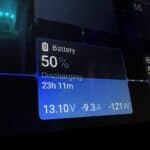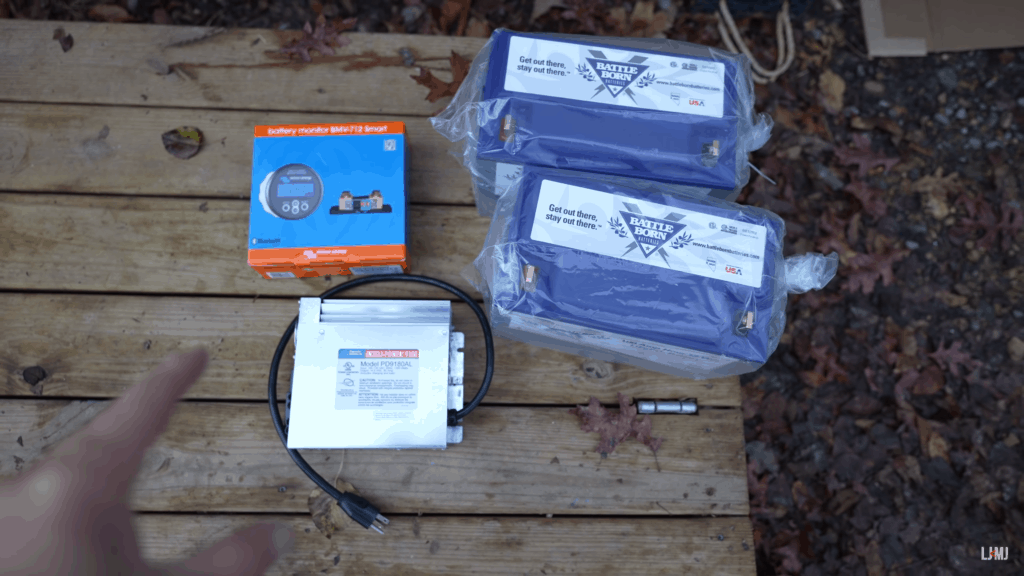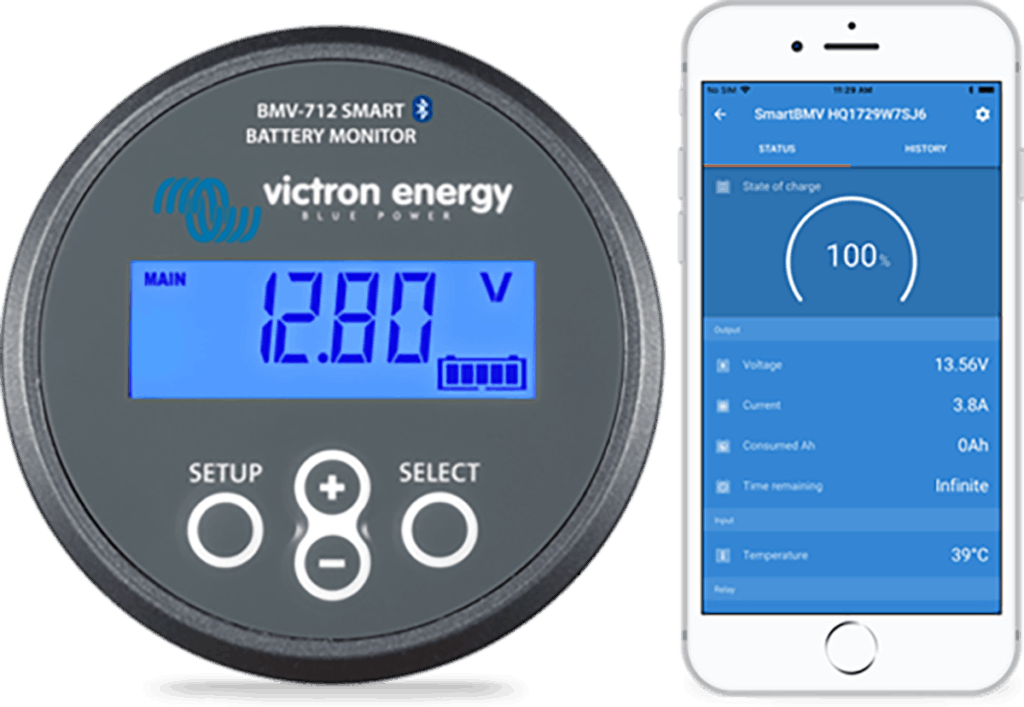
MENUMENU
TALK TO AN EXPERT
Special Hours: 7AM – 6PM PST
TALK TO AN EXPERT
Special Hours: 7AM – 6PM PST
Marissa and Nathan of Less Junk More Journey live full-time in an RV with their two young children, Hensley and Judah. The family recently acquired a new RV, and one of the first upgrades they made to it was the installation of lithium batteries.
Let’s peek in at their fabulous RV life and see how and why they decided to make this upgrade so quickly!
Less Junk More Journey’s new RV is a Grand Design Solitude 378MBS mid-bunk model. It did not come with lithium batteries pre-installed, but what it did come with is a full-sized residential refrigerator!
This type of fridge is excellent (and maybe even necessary) for a family of four whose RV is their full-time home. But, providing sufficient power to run a residential refrigerator is a challenge. This is especially true when the family spends time boondocking (camping without hookups) or even just overnighting in a parking lot during a lengthy trip.
A typical residential refrigerator draws around 725 watts, according to the United States Department of Energy. If we divide 725 by 120 volts (because that’s the AC power supply voltage in the RV), we’ll get the current that the refrigerator draws, measured in amps (or amperes). So a 725-watt refrigerator draws around 6 amps (725 ÷ 120).
Less Junk More Journey knew that they would need adequate battery power to run their residential refrigerator off the grid. They would also require battery power for numerous other things like their heater’s blower, lights, various electronic devices, fans, etc. They’d had lithium batteries in their previous RV. So they knew from experience that they’d need them in their new home-on-wheels.
For these reasons, they decided to install lithium batteries immediately after acquiring their new RV. Read on to see what they did once they’d made this decision!
Less Junk More Journey chose two 100 Amp Hour 12-Volt LiFeP04 lithium batteries made by Battle Born. These are deep cycle lithium-ion batteries. At 31 pounds apiece, these batteries weigh about 50 pounds less than their previous lead-acid batteries and have about four times the power.
Battle Born Batteries have an excellent life expectancy of approximately 3000-5000 cycles. They have a 100 Amp Continuous current and a 200 Amp surge current (for 30 seconds). These ratings are necessary when many appliances are in the initial start-up phase of running.
Nathan decided to take on the project as a DIY install with the help of his friend Mike, from “The Dry Campers.” The two rated the DIY project as “easy,” so keep reading to see just how easy this install really was!

As part of this lithium battery system, Less Junk More Journey installed a couple of other important components. Let’s have a look at each of them to understand their significance to the installation better:
The Progressive Dynamics 12 V 60-amp LiFePO4 battery converter charger replaced the converter charger that came with the new RV.
The RV manufacturer, Grand Design, installed the original converter charger in the RV to charge the lead-acid batteries that came with the RV. This type of converter charger would charge the lead-acid batteries very slowly to prevent overheating. It would also prevent the potential for lead-acid battery explosion. So while the power coming out of the original converter charger was 55 Amps, it delivered that power to the batteries in short bursts, very slowly.
However, a lithium battery will take all of the power delivered to it in bulk charge. So the new Progressive Dynamics 60-amp LiFeP04 converter charger will charge the new lithium-ion batteries much more quickly.
Had Less Junk More Journey decided to keep the original converter charger, it would have taken multiple days to charge the new lithium batteries up every time they needed replenishing. Now you understand why Marissa and Nathan got the new 60-amp LiFeP04 converter charger as part of their new battery system install!
Also included in Less Junk More Journey’s installation was a Victron BMV 712 battery monitor. Adding this battery monitor to their install will allow them to monitor their batteries’ condition at a glance.
They can mount the digital display inside their RV (which will require running wires from the battery to that location), or they can monitor the condition of their batteries using Victron’s app via BlueTooth from their phones. They’ll see how many amps are coming back into the batteries as they’re charging and how much power is being drawn from the battery bank.

While the advantages of lead-acid vs. lithium batteries are
Lithium batteries are highly efficient. A Lithium-ion is said to have a 99 percent charge efficiency and a very low discharge loss. Lithium batteries are more stable and are capable of being recharged hundreds of times.
Lithium batteries charge at a much faster rate than other types of batteries. So when Less Junk More Journey uses a lot of their battery power while they’re off the grid, for example, it will take far less time to recharge those new lithium batteries!
Unlike flooded lead-acid batteries with water levels that you must monitor, lithium-ion batteries do not require water. So, they require far less maintenance.
Lithium batteries may cost more to purchase at the outset, but they have a longer lifespan than other types of batteries used in similar applications. This means that you don’t have to replace them as frequently.
Battle Born LiFeP04 batteries are robust, long-lasting batteries with a lifespan of up to ten years if cared for properly. This extended life presents significant savings over other types of batteries that need to be replaced every three to five years, even if properly maintained.
It is easy to see why Marissa and Nathan Moss of Less Junk More Journey decided to replace their new RV’s batteries with Battle Born lithium-ion batteries. They’re more efficient and will keep their home-on-wheels supplied with power that recharges more quickly.
In the end, they’ll see significant cost savings and peace of mind while boondocking off the grid or even just overnighting in a Walmart parking lot. Meanwhile, that handsome new full-sized residential refrigerator will keep their food and beverages cold and safe, which is priceless!
We know that building or upgrading an electrical system can be overwhelming, so we’re here to help. Our Reno, Nevada-based sales and customer service team is standing by at (855) 292-2831 to take your questions!
Also, join us on Facebook, Instagram, and YouTube to learn more about how lithium battery systems can power your lifestyle, see how others have built their systems, and gain the confidence to get out there and stay out there.
Shop Best Sellers








Ask a technical specialist now at 855.292.2831
Stay in the Know
3 thoughts on “Less Junk More Journey Installs Lithium Batteries In New Fifth Wheel RV”
I have two new 100Ah LiFePO4 batteries in my class B. They discharge to around 76-80% overnight depending on what I run, but the recharge more slowly than anticipated (4-5hours) unless I run the engine for 5min then they are fully charged. I wonder if my Zamp controller is slowing this process? Also, I know that you shouldn’t discharge SLA batteries below 50%—is it the same number for LiFePO4? Thanks!
Hi Dena, thanks for reaching out. Please give our sales and tech team a call at 855-292-2831 to help assist with any troubleshooting with your batteries and system. The FAQ section on our website notes that batteries will deliver their advertised power, even if you discharge them in an hour.
Hey Marissa and Nathan, on your suggestion I am going to install these lithium batteries in my camper because on my last trip to Texas, I had a very bad voltage experience due to regular glass mat camper batteries. I want you to suggest any lithium battery that has a good warranty too.